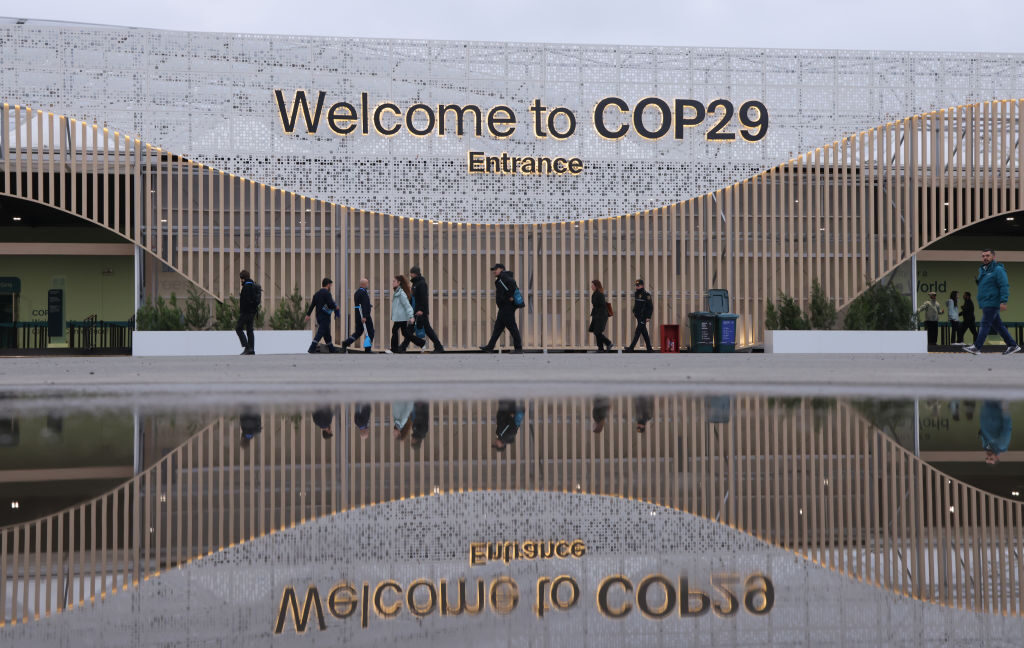The world’s most important climate talks were pulled back from the brink of collapse after poorer countries reluctantly accepted a finance package of “at least” $300 billion a year from wealthy nations after bitter negotiations.
Fears about stretched budgets around the world and the election of Donald Trump as US president, who has described climate change as a “hoax,” drove the developing countries into acceptance of the slightly improved package after Sunday 2:30 am local time in Baku.
The UN COP29 climate summit almost collapsed twice throughout Saturday evening and into the early hours of Sunday morning, as vulnerable nations walked out of negotiations and India objected stridently.
As the gavel came down, India’s lead negotiator, Neelesh Shah, leapt to his feet to ask to take the floor, and when he was ignored made a furious timeout gesture above his head and led his team on to the stage in protest.
Speaking from the floor, Indian delegation member Chandni Raina said the country was “extremely disappointed” by the abrupt passage of the agreement, adding: “This was stage-managed.”
“It is a paltry sum,” she said. “I am sorry to say that we cannot accept it. We seek a much higher ambition from developed countries.” The agreement was “nothing more than an optical illusion,” she added.
The broadside was followed by objections from Bolivia, Chile, and Nigeria, who were told by COP29 President Mukhtar Babayev that their statements were noted. Smaller nations, such as Malawi, Fiji, and the Maldives, joined in the grievance.
Simon Stiell, head of the UN climate change arm, said the new goal was an “insurance policy for humanity, amid worsening climate impacts hitting every country” but added that it was “no time for victory laps.”
European Union climate commissioner Wopke Hoekstra tried to assure disappointed smaller nations, saying he was “confident we will reach the $1.3 trillion” economists say developing countries need to shift to green energy and cope with climate change.
Under the deal agreed on by almost 200 countries, wealthy nations said they would take the lead in providing “at least” $300 billion in climate finance by 2035 to help developing countries cope with climate change.
This was improved from an initial $250 billion offer but well short of the $500 billion the G77 group of developing nations had sought.
A representative for Cuba, which has suffered from devastating hurricanes, noted the pledge of $300 billion represented less than the previous goal of $100 billion agreed more than a decade ago, taking into account inflation.
The finance goal was “at the boundary between what is politically achievable today in developed countries and what would make a difference in developing countries,” said Avinash Persaud, an adviser to the Inter-American Development Bank.
The deal would only work “if this money is primarily to help vulnerable countries become more resilient to climate change” and backed by efforts from multilateral development banks, he said.
The final plenary session was repeatedly suspended through Saturday to the early hours on Sunday to allow huddling and haggling between countries, after the summit ran overtime from the scheduled Friday close.
The most critical moment came when alliances of small island nations and least-developed countries representing about 80 countries walked out on the finance discussions in frustration.
The finance talks were just one of several strands of discussion taking place at the event in Baku.
On Saturday, Germany accused the petrostate host Azerbaijan of backing attempts by fossil fuel producing countries to hijack the summit.
Annalena Baerbock, Germany’s foreign affairs minister, had warned that a “few fossil fuel states” were attempting a “geopolitical power play.”
Baerbock said oil and gas-producing nations were playing a game on the “backs of the poorest and most vulnerable countries.”
Several people involved in the talks told the Financial Times that countries led by Saudi Arabia and Russia had made efforts to block any references to advancing last year’s agreement to transition away from fossil fuels.
© 2024 The Financial Times Ltd. All rights reserved. Not to be redistributed, copied, or modified in any way.


